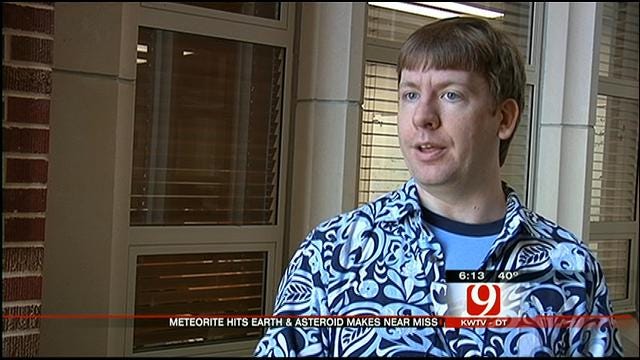Oklahoma Astronomers React To Meteorite Crash, Asteroid Flyby
Astronomers here in Oklahoma say what's unfolded in the past couple of days is something we'll see maybe once in a lifetime. That's because a meteorite crashing into the Earth is so rare.Friday, February 15th 2013, 7:27 pm
You could call it a cosmic coincidence.
A meteorite sends fireballs crashing to earth injuring hundreds of people in Russia. At the same time, an asteroid comes close to our planet.
Astronomers here in Oklahoma say what's unfolded in the past couple of days is something we'll see maybe once in a lifetime. That's because a meteorite crashing into the Earth is so rare.
However, even here in our state, there are scientists every day closely monitoring what's out in space.
A meteorite explodes over Russia Thursday, causing shockwaves, shattering windows and injuring hundreds.
Scientists say it was about the size of a large bus, and it was traveling more than 33,000 miles an hour.
Oklahoma astronomers say meteor strikes with such a large impact are so rare, we probably won't see one like this again for decades.
Dr. John Wisniewski teaches astronomy at the University of Oklahoma.
"We have close encounters with space rocks all the time, and the chance or probability in our lifetime we'll have a collision with a space rock that'll cause significant damage is very, very, very rare," Dr. Wisniewski said.
Even so, an entire team at NASA monitors these kinds of so-called space rocks.
"The reason we're monitoring the locations and orbits of these larger bodies is that if one of those would strike the Earth, it would cause a lot more damage than the one yesterday," Dr. Wisniewski said.
Scientists monitor *thousands of asteroids a year orbiting the Earth.
"Space rocks, like stars, and you and I, are emiting radiation in the infrared, so effectively, NASA's using night vision goggles to track space rocks," Dr. Wisniewski said.
So they're able to see if and when a space rock could impact us.
"For everyday living, it's not something I worry about, not something you should worry about at home, but be aware that it is something astronomers and NASA scientists are looking at to try to protect us," Dr. Wisniewski said.
Where the blast happened in Russia is about 3,000 miles away from the site of the largest recorded explosion of a space object back in 1908.
That asteroid we mentioned also passed by Earth Friday afternoon. It didn't do any damage and scientists say it won't come around again until 2046.
More Like This
February 15th, 2013
November 13th, 2024
October 28th, 2024
October 17th, 2024
Top Headlines
November 27th, 2024
November 27th, 2024
November 27th, 2024
November 27th, 2024










